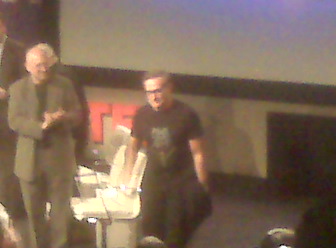Back in January, I wrote a summary of Larry Chiang’s article, How to Work the Room, a guide to “gracing” your way through a social or networking event (the article was inspired by a Guy Kawasaki post, which in turn was inspired by Susan RoAne’s book, How to Work a Room).
Of the ten tips listed in Chaing’s article, two were centered around being more of a host than a guest. This doesn’t mean that you should take over the party, but doing some host-like things, including introducing people, making the other guests more comfortable, saying “hi” to wallflowers and offering to help to the host.
People at the TED Conference (TED is short for Technology/Entertainment/Design, it bills itself as “group of remarkable people that gather to exchange ideas of incalculable value”) witness a great example of the “be more of a host than a guest” principle. At a panel discussion featuring these people:
- Sergey Brin, co-founder of Google
- Queen Noor of Jordan
- Carl “All the President’s Men” Bernstein
- Harvard psychologist Dan Gilbert
- Ugandan journalist Andrew Mwenda
…a “technical glitch” stalled the panel discussion. Normally, this sort of interruption results in a lot of embarrassing dead air and a restless audience, but according to this Wired article, Robin Williams stepped in and helped out:
Cellphone photo of Robin Williams at TED taken by Paul Holland.Before the host, BBC World presenter Matt Frei, could finish his introduction of panelist Sergey Brin from Google, he announced there was a technical issue. Frei didn’t quite know what to do with the empty air while waiting for a fix and joked that the voice in his earphone (the producer) was telling him a long, elaborate political joke about Poland.
That’s when a voice behind me spoke up, presumably a heckler, and began speaking loudly as if he were conducting a live news feed, joking that he was reporting live from TED but “couldn’t understand a fucking word” and was “wondering why at a technology conference everything is running so shittily” (at least that’s the word I think he used; it was hard to hear the last word through the audience’s laughter).
The crowd by then had realized it was Williams. Encouraged by their reaction, he continued reporting to some unseen BBC anchorman from his seat: “Well, they said they found the wire, but it’s not plugged in.”
Williams was then invited to take the stage and the crowd roared. He spent the next ten minutes or so riffing on Stephen Hawking (who spoke at TED earlier in the day from Cambridge, England) and the end of the universe — which will take place “exactly in one hour,” he said, looking at his watch.
He joked again about the technical glitch, indicating that although the BBC wasn’t working, audience members “with their phones are going, ‘I’m getting all of this!'” And it was true. Dozens of people were capturing the stand-up act on their phones.
He riffed about a new Apple product called the “iWhy?” and a few seconds later said he had just one question about the British royal family: “All that money and no dental plan,” he deadpanned, which got a lot of laughs and a few sympathetic nods toward the BBC presenter sitting behind him (who appeared to have perfectly fine dental hygiene).
He didn’t spare panelist Brin and Google, noting that if you walk into Google you see everyone in front of their computer sitting on exercise balls, “which I think is how they’re hatching new employees.”
And Israel got a mention as well, since it was launching a new internet service called “Net-an-yahoo” (riffing on Bibi Netanyahu’s name).
The glitch was finally fixed but not before TED curator Chris Anderson asked Williams to come back the next day and lend the proceedings some more of his good cheer.
(An aside: Did Kim Zetter, the author of the article, have to use some form of the word “riff” three times in five paragraphs? We should send her a thesaurus.)
This sort of emergency is why I take the accordion with me — it’s helped me help out a host in a number of situations.
